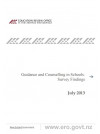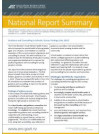This report presents the findings of three online surveys about the current provision of guidance and counselling in schools with students in Years 9 to 13. This is the first phase of work being undertaken by ERO as part of the Prime Minister’s Youth Mental Health Project.
Methodology
ERO gathered information from school leaders, guidance counsellors and students via online surveys on during Term 1, 2013. School leaders and guidance counsellors at all schools receiving the Guidance Staffing Entitlement were invited by email to complete a survey. Students were invited to complete the survey through the Ministry of Youth Development youth database. Respondents were not asked to state their school or any other identifying factors.
The responses from each group were:
- 91 students
- 105 school leaders
- 180 guidance counsellors.
The findings of these surveys should be considered in light of the number of responses and, in the case of students, their gender and ethnicity.
The survey for students was developed in conjunction with the Ministry of Youth Development and focused on:
- characteristics of good guidance and counselling
- models of practice – what works well, and what does not work as well, in schools
- access to, and approachability of, guidance and counselling staff
- suggested changes to improve guidance and counselling in schools.
The survey for school leaders focused on:
- their approach to guidance and counselling support
- their use of the Guidance Staffing Entitlement
- hours allocated to guidance and counselling and teaching for guidance counsellors
- professional supervision for guidance counsellors
- qualifications and professional membership of guidance counsellors
- policies and procedures – employment decisions, complaints, ethical practices, and conflicts of interest relating to guidance and counselling
- staff other than guidance counsellors responsible for guidance and counselling – allocated hours, professional supervision, qualifications, professional membership, policies and procedures relating to their role in guidance and counselling
- self review regarding students’ access to good guidance and counselling
- reporting to the board of trustees about students’ access to good guidance and counselling
- effective practice and challenges relating to guidance and counselling.
The survey for guidance counsellors focused on:
- key aspects and responsibilities of their position
- hours allocated to guidance and counselling and teaching
- professional learning and development
- professional supervision
- management and appraisal of their position
- policy guidance and procedures
- reporting to the board of trustees about guidance and counselling
- working relationships – both with staff, students and parents/whānau (internal) and with external agencies
- professional membership and qualifications relating to guidance and counselling
- effective practice and challenges relating to guidance and counselling.


